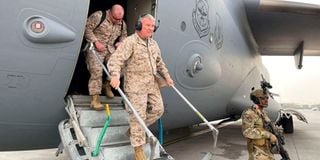Premium
Foreign control is a tough trade

This US Navy photo released on August 18, 2021 shows US Marine Corps Gen. Frank McKenzie, the commander of US Central Command, as he arrives at Hamid Karzai International Airport, Afghanistan on August 17, 2021.
What you need to know:
- There was a time when occupations, colonialism and imperialism were more successful — that is, lasting 75 years and more.
- So what does it take for imperialism, or a foreign military campaign, even a peacekeeping one, to be relatively successful?
After 20 years, the United States and its allies are leaving Afghanistan humbled as the Taliban retake the capital Kabul. For all the breathless reporting about the surprise at the lightning advance of the Taliban, the dramatic collapse of the government and the disaster that America has suffered, this was a story long in the making.
What it has taken the superpower to purchase defeat tells us how well-nigh impossible occupation and conquest of foreign lands have become in modern times.
Forbes reports that, since September 11, 2001, the “US has spent more than $2 trillion [Sh200 trillion] on the war in Afghanistan. That’s $300 million per day, every day, for two decades. Or $50,000 for each of Afghanistan’s 40 million people. In baser terms, ‘Uncle Sam’ has spent more keeping the Taliban at bay than the net worth of Jeff Bezos, Elon Musk, Bill Gates and the 30 richest billionaires in America combined.
“And the costs are even greater in terms of lives lost. There have been 2,500 US military deaths in Afghanistan and nearly 4,000 more US civilian contractors killed. That pales beside the estimated 69,000 Afghan military police, 47,000 civilians killed plus 51,000 dead opposition fighters.”
Russia’s adventure in Afghanistan earlier, in 1979 -1989, lasted only half the period of America’s but was more ferocious and deadlier. About 15,000 Soviet soldiers were killed and another 35,000 injured. A mind-boggling two million Afghan civilians were killed.
Uncomfortable to say it, but there was a time when occupations, colonialism and imperialism were more successful — that is, lasting 75 years and more. The Ottomans, Spaniards, Portuguese and British were particularly good at it. For crying out loud, the Philippines was under Spanish rule for 333 years, the longest occupation.
Amisom media junket
So what does it take for imperialism, or a foreign military campaign, even a peacekeeping one, to be relatively successful?
The first time I went to Mogadishu, shortly after the African Union Mission in Somalia (Amisom) had kicked Al-Shabaab out of the battered city, one could quickly see the possibilities and perils.
A bunch of us journalists arrived on what, if truth be told, was an Amisom media junket. The situation at the Aden Adde International Airport was stressful. As soon as we identified our bags, Somali carriers started bumping us and jostling to carry them (for a fee). The Amisom military party that received us stood by, stone-faced, and did little to save us from the chaos until we made it out and they led us into armoured personnel carriers.
When we returned on our way out days later, it was even worse. We were knocked over, shoved and hauled from one corner of the check-in area to another. The Amisom fellows who’d brought us to the airport again did nothing until, finally, one of them called a Somali airport official and, after a whisper in his ear, he came and shouted around and we made it through.
By then it had become clear why an Amisom that called the shots in Mogadishu was eager to not publicly show authority over local officials and airport hustlers: It doesn’t sit well if you are a foreigner. When you are in other people’s countries and you are the powerful one, you buy time by playing as powerless as you can. It is nearly an impossible task, and even for Amisom, the rewards have been modest.
Parachute journalism
Modern occupations also have a peculiar problem: The technological superiority of the conqueror becomes a liability. Foreign armies fly in in aeroplanes, drones, satellites and all sorts of fancy technology covering them. They take an airport, or a field, and establish a fortress as their base. They are never part of the community and venture out mostly in armoured cars, bulletproof vests and helmets.
Earlier conquers arrived by foot and, maybe, on horseback. They walked the roads, climbed the hills, met people along the way, learnt a bit of their language, ate local food and often pillaged the towns along the way. By the time they reached the capital, where the king or chief ruled, they had some local knowledge.
Today’s imperialism suffers the problem of “parachute journalism”. A chap flies in from New York, lands at JKIA, and the next day is in Laikipia pretending to know the dynamics driving the conflict between ranchers and nomadic cattle keepers.
Successful conquerors from earlier times in Europe also got down and were very personal. They married the local women, carefully picking brides from chiefly and royal families to expand their influence and buy acceptance.
Times have changed, and societies are different. Occupying armies patronise brothels. The local elite they extend patronage to aren’t prestigious, nor do they have the respect of the communities. They have very few paths to peoples’ hearts.
The market for imperial occupation, and colonialism, has collapsed. The powerful have to invent more creative forms of dominion over other people if they want to remain in the business.
Ms Onyango-Obbo is a journalist, writer and curator of the Wall of Great Africans. @cobbo3





